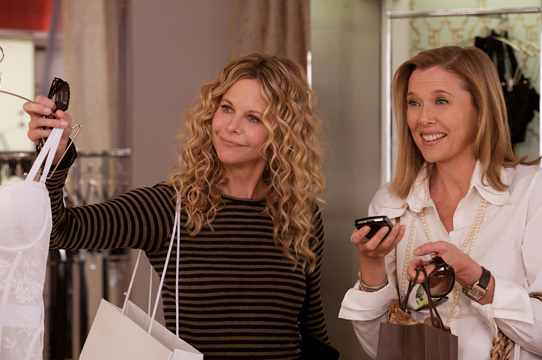 Meg Ryan and Annette Bening try to shop their troubles away in The Women.
Meg Ryan and Annette Bening try to shop their troubles away in The Women.
|
The Women
Starring Meg Ryan, Eva Mendes, and Annette Bening. Written and directed by Diane English, based on Clare Boothe Luce’s play and Anita Loos and Jane Murfin’s screenplay. Rated PG-13.
|
|
A D V E R T I S E M E N T
|
|
|
|
A D V E R T I S E M E N T
|
|
The Women
After 69 years, The Women needed a funnier facelift than this new version.
By KRISTIAN LIN
Fourteen years ago, Hollywood announced its plans for a contemporary remake of George Cukor’s 1939 all-female comedy The Women that would star Meg Ryan and Julia Roberts, with a DELETE by Diane English, who was then fresh from creating the headline-making TV sitcom Murphy Brown. The project was hotly anticipated, but scheduling and creative issues conspired to delay the movie for more than a decade as it bounced from studio to studio, lost directors and actresses (including Roberts), and was pronounced dead on several occasions. It didn’t die, though, and now it’s finally in theaters, financed by a boutique studio, with English pulling double duty as writer and first-time director. It seems to have the right ingredients in place for a really good movie, too, but after all this time it’s just a regrettable missed opportunity.
The new movie preserves the original’s concept: No men appear onscreen or are heard speaking on the soundtrack. Ryan plays Mary Haines, a wealthy Connecticut mom who gets fired by her dad from his fashion design business because she’s so wrapped up in meeting her lengthy social obligations and caring for her 13-year-old daughter (India Ennenga). Unsettled by that development, she’s then taken completely by surprise when a chatty Saks Fifth Avenue manicurist (Debi Mazar) — who doesn’t know who Mary is — informs her that her Wall Street-executive husband is having an affair with Crystal Allen (Eva Mendes), one of Saks’ perfume sellers. As with the original, nothing happens for a long while after this comes to light. Mary bides her time while trying to figure out her next move and fielding advice from her mother (Murphy Brown herself, Candice Bergen), her friends, and especially her longtime best friend, Sylvie Fowler (Annette Bening), who’s much nicer than her counterpart in the original movie.
The original film’s attitudes about women look horribly retrograde now, but they were couched in a terrifically funny female-written DELETE. (“You simply must see my hairdresser. I detest whoever does yours.”) English does some much-needed updating, replacing the original’s insulting animal-themed opening credit sequence with a nifty one showing each character’s feet as she walks down the street. Sadly, she’s overmatched comedically — her jokes raise a few dry chuckles but nothing more. Her direction does a fair amount to cover this up, exhibiting a fine sitcom-honed sense of when to hit the punchline and move on to the next scene. The comic material may not be up to scratch, but English at least keeps things brisk.
The cast does, too. Besides Sylvie, Mary’s closest friends are eternally pregnant housewife Edie (Debra Messing) and commitment-shy lesbian Alex (Jada Pinkett Smith). Though these characters don’t have a clear reason for habitually hanging out together, the four actresses’ teamwork is almost as sharp as the Sex and the City quartet’s, with everybody having everybody else’s comic rhythms down pat. Ryan and Bening make a strangely effective pair, too, with a pleasing contrast between their voices and demeanors (Ryan’s soft but resilient, Bening’s hard-shelled but vulnerable). Bening’s particularly well-suited to the role of a woman who’s equally willing to dispense tough love to her friend and to destroy anyone who hurts her. You want someone like her to have your back when your marriage is falling apart.
The movie loses this in the second half, though, when the friends drop away and Mary becomes estranged from Sylvie. The ennui that sets in here isn’t as bad as it is in many other female-centric dramas, but Mary’s fumbling toward self-sufficiency doesn’t play as well as it should, nor does the subplot with Sylvie becoming a mentor to Mary’s daughter. Another subplot has Sylvie’s shaky job status as a magazine editor affecting her friendship with Mary. It’s a clever idea by English the writer, but English the director mishandles it.
There’s also an off-putting note of class snobbery here directed at “the spritzer girl,” as Crystal is tagged by Mary’s friends. Crystal isn’t rich like the other women, and the original movie extended a small measure of empathy to her for wanting the same cozy life as the privileged customers she waited on. This movie lacks that dimension; perhaps a more likable actress than Mendes in the role would have supplied it. Still, it seems like Crystal’s real crime here is being a trashy outsider rather than stealing somebody’s husband. That’s backward.
Like the original, the new version of The Women incorporates a fashion show into the film, although here it’s connected to the plot and comes at the end. It’s a better conclusion than the 1939 film’s self-abnegating line, “Pride is a luxury a woman in love can’t afford.” Yet as decent an impression as this movie does of a crackling comedy, the lack of funny punchlines is hard to overlook. This thing needed Diablo Cody or Nicole Holofcener or maybe even the women who wrote The House Bunny. Any of them could have given this old story the contemporary hook and the laughs that it deserved.
 Email this Article...
Email this Article...

